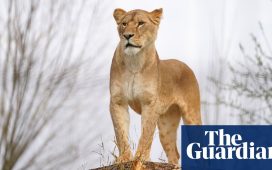One man was gored and two sustained head injuries during the first run of the week-long San Fermín running of the bulls festival in Pamplona, northern Spain, on Saturday. The injuries were not life-threatening.
During the festival the population of the small city in Navarra swells tenfold as more than a million people come from around the world. Only about 20,000 over the course of the week dress up in the traditional red and white to pursue and be pursued by the bulls along Pamplona’s cobbled streets.
With a million visitors spending on average €100 each per day, the event is a money-spinner for the town, especially for the bars which, under new rules, are allowed to stay open 18 hours a day. Homeowners with balconies along the route rent them out for €50-€200 to visitors to enjoy the approximately 15 seconds it takes for the bulls to pass.
In recent years, however, the event’s reputation has been marred by a steady increase in complaints from women that they have suffered sexual harassment and abuse.
This culminated in La Manada, when five men who had styled themselves “the wolf pack” raped an 18-year-old woman during the festival in 2016. The five were jailed for 15 years last month after a protracted legal process often criticised for its perceived leniency towards the rapists.
This year the organisers say that, in addition to the thousands of police on duty, agents from the family and women unit will be on duty to deal with, and hopefully prevent, abuses.
There is also a San Fermín app that, as well as offering information about events around the city, gives advice on how to deal with and report sexual offences.
An information point was set up on Friday specifically to inform people about the issue and also to deal with complaints from women. It has a staff of six trained in dealing with sexual offences who between them speak Spanish, English, French and Basque.
The local and national police, some on horseback, have been joined by uniformed officers from France and Italy, agents form the US embassy and riot police from Bilbao.
The city council reaffirmed in a statement its “commitment to continue working for a festival in which men and women can freely and safely enjoy themselves”.
The statement added that reports of sexual aggression would be dealt with in a “coordinated and consistent manner” and thanked feminist groups for their active involvement in helping to eradicate sexual attacks.
Before today’s opening encierro, as the bull runs are known, the streets along the route were treated with 1,500 litres of anti-slip liquid which helps to prevent the animals from losing their footing and also allows them run faster.
The event is a target for animal rights activists and on Friday members of People for the Ethical Treatment of Animals (Peta) staged a protest in which they lay semi-naked on cut-out bull shapes resembling the chalk outline of bodies found at crime scenes.
Jordi Casamitjana, Peta’s campaigns manager, said most people did not realise the bulls were killed in the ring after the run, adding that the bull run itself was barbaric and that the animals were terrified. Peta claims that some 125 Spanish cities have banned bullfighting.
“Most of the protesters are Spanish,” Casamitjana said. “The reality is that the majority of Spaniards are against bullfighting. A lot of people don’t come to Pamplona in July because of San Fermín and a lot more tourists would come here if they banned it.”













